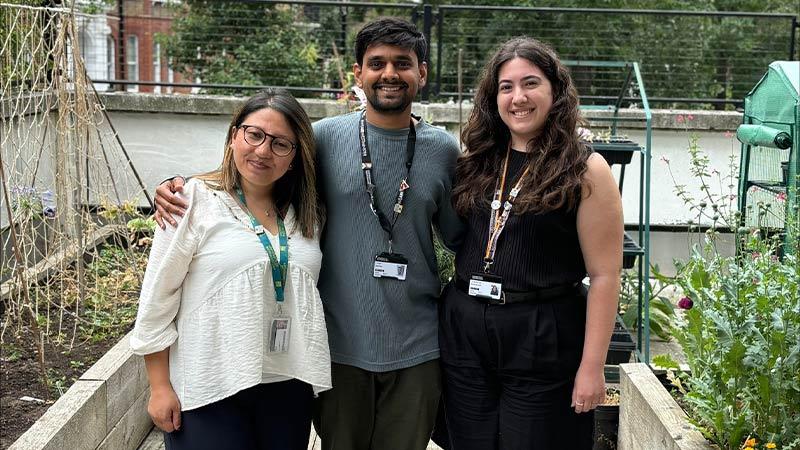On 8 August, the University of Westminster's Marylebone Campus became a hub of mindfulness, sustainability and environmental connection as the Sustainability and Equality, Diversity and Inclusion (EDI) teams, along with the Cavendish Living Lab, hosted Green Therapy Day. The event gave people the chance to be mindful, learn from others and connect with nature.

Green Therapy Day was designed to help participants manage eco-anxiety, a psychological response to the environmental crises, by encouraging them to reconnect with the natural world. The event brought together a diverse group of Westminster colleagues, students and prospective students, all eager to engage in practices that promote both personal wellbeing and environmental appreciation.
Led by Anastasia Lydaki, Sustainable Development Advisor, Dr Pooja Basnett, Senior Lecturer of Biological Sciences BSc Honours and Co-lead for the Cavendish Living Lab, and EDI Officer Rajat Shah, the event opened with an interactive session focused on biodiversity drawing, a calming practice that allowed participants to immerse themselves in the beauty of nature's intricate designs. The session highlighted how engaging with nature through art can help alleviate eco-anxiety, offering participants a creative outlet to express their environmental concerns and foster a deeper connection with the natural world.
Anastasia Lydaki, who led the first session focusing on navigating eco-anxiety through the biodiversity drawing session, said: “It felt wonderful that we joined forces with the EDI team and the Cavendish Living Lab teams to create such a calming and interactive day for all. Watching our natural world change can evoke a range of emotions, and it can sometimes be overwhelming. By fostering an inclusive space, we were able to connect with our feelings, unleash our creativity and discover meaningful ways to care for our planet. Together, we inspired each other to take simple but impactful actions that nurture both our environment and our mental wellbeing. The joy each participant found in the drawing process further enriched the experience, making it a truly fulfilling and memorable activity and day for everyone involved.”
Participants reconvened after lunch for a sensory experience focused on sustainability. This hands-on activity involved sowing a variety of microgreen seeds, offering a practical demonstration of how to grow nutrient-rich greens at home. Participants learnt about the benefits of microgreens, which can be harvested and consumed in just seven to ten days, making them a quick and sustainable source of fresh produce. The session not only educated attendees on the simplicity and effectiveness of growing their own food but also provided a tactile, sensory-rich experience that deepened their connection to nature. This session was led by Susannah Hall from Permablitz London. A permablitz is a gathering of individuals who, using a permaculture design, spend the day creating or developing an edible, wildlife-friendly garden for the community or home. Projects for sustainable non-food growth can also be included in permablitzes. For instance, environmentally beneficial construction projects include planting fuel plants, creating compost toilets or retrofitting existing homes.
The final session of the day focused on waste management led by Sushant Bali, Sustainability Practitioner and Environmentalist offering participants practical insights into sustainable living. This session covered a range of eco-friendly practices, including creating fertiliser from banana peels, composting techniques, and making a natural cleanser using citrus peels and white vinegar. These hands-on activities demonstrated how everyday waste can be repurposed into valuable resources, further enriching participants' understanding of the intersection between mindfulness and sustainability. The session provided a fitting conclusion to a day dedicated to deepening individuals’ connection with nature while promoting sustainable and mindful living practices.
The University hopes to build on this momentum of mindfulness and environmental connection, continuing to offer opportunities for learning, growth and collective action in support of a more sustainable and mindful world.
Dr Pooja Basnett said: “It was fantastic collaborating with the EDI and Sustainability teams to organise the Green Therapy session. Opportunities to connect with colleagues from different disciplines are rare, so it was great to meet like-minded individuals and connect with nature. I look forward to being involved in many more events like this in the future.”
Rajat Shah expressed enthusiasm about the collaboration, adding: "It was exciting to see the three teams come together for the first time to help our colleagues and students experience wellbeing and reconnect with nature.”
Professor Dibyesh Anand, Deputy Vice-Chancellor for Global Engagement and Employability and Co-chair of the EDI Committee and SDG Coordination Group, said: “Bringing EDI and SDG related work together makes our task of making communities more inclusive, fair, as well as sustainable and much easier. This event is reflective of our determination to not operate in silos but to cooperate and coordinate.”
This event directly contributes to the United Nations Sustainable Development Goals (SDG) 3: Good Health and Wellbeing, 12: Responsible Consumption and Production and 17: Partnerships for Goals. Since 2019, the University of Westminster has used the SDGs holistically to frame strategic decisions to help students and colleagues fulfil their potential and contribute to a more sustainable, equitable and healthier society.
For more information on future events, contact the Sustainability Team or EDI Team.






